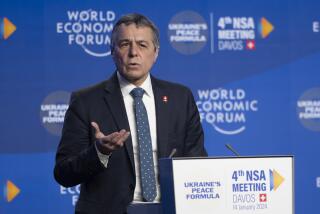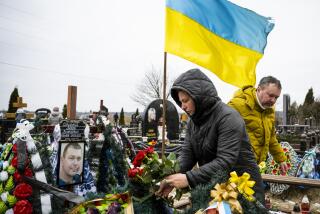Conventional Arms Talks Lose Momentum of 1989 : Diplomacy: Soviets may be rethinking their position in the wake of the dramatic changes in Europe.
- Share via
VIENNA — The European talks on conventional arms control resumed here Monday amid concern that agreement will not be reached by the end of the year.
Soviet negotiators are said to still be looking to Moscow for instructions on various knotty matters as yet unresolved in the weapons reduction talks among the 23 nations here.
Officials say that the momentum needed for an accord this year must come from Moscow, possibly during this week’s talks there between U.S. Secretary of State James A. Baker III and his Soviet counterpart, Eduard A. Shevardnadze.
Chief Soviet negotiator Oleg A. Grinevsky is in Moscow with Shevardnadze and is not expected to arrive here before next week.
Soviet support for a positive result is thought to depend on how the Kremlin views the outcome of the current six-nation meetings on German unification.
“The talks here are not necessarily on hold,” said one Western negotiator in Vienna. “But we see signs that the Russians may be rethinking their position. So much has happened since the talks began 16 months ago. It would not be surprising if the Soviets had second thoughts about Europe. Obviously, they are worried about Germany.”
Last year, negotiators from the 16 members of the North Atlantic Treaty Organization and the seven Warsaw Pact countries made dramatic progress in the conventional arms talks. Agreement appeared to be near on setting limits for tanks, artillery and armored vehicles based along the Central European front.
In February this year, foreign ministers of the participating nations also agreed to reduce U.S. and Soviet ground personnel stationed outside national territory--in the central European region--to 195,000 for each side.
Most observers thought that a broad agreement would therefore be reached by late this year, then ratified at a summit meeting of the 35-nation Conference of Security and Cooperation in Europe (CSCE).
But the steam driving the conventional forces talks here seems to have dissipated in the last two months as the Soviet Union uneasily watched the rapid moves toward German unification.
Baker and others have indicated that there is no point in holding a CSCE summit, scheduled for Paris, unless the centerpiece of such a meeting is a conventional forces treaty ready to be signed.
“One can understand the Soviets desire to reassess the wide range of arms talks,” said one official here. “But reduction of conventional arms in Central Europe is in all our interests. And we may not have the opportunity again. I hope the Russians realize this.”
The toughest issue still confronting negotiators here is the reduction of combat aircraft in Europe: NATO and the Soviet Union do not agree on ceilings and how to classify interceptors, trainers and bombers.
Some diplomats argue that the aircraft issue should be separated and left for a later round of the conventional forces talks, known by the initials CFE, so that it does not hold up a treaty on armaments and manpower, issues on which agreement is said to be close.
U.S. negotiators say it is important to develop the framework of a conventional forces treaty that would be ready by year’s end.
“The important thing,” said one veteran NATO diplomat, “is to get CFE-I signed--which would substantially reduce the conventional arms in Europe. After that, we can enter into a CFE-II and discuss the size of the West German army, post-reunification--and a lot of other matters that will only complicate current negotiations.”
Another official here added: “We are not sure whether the Soviet slowdown is part of the end-game to a successful CFE negotiation, or whether Moscow is truly confused as to what kind of settlement it wants now that the power balance in Europe is changing.”
More to Read
Sign up for Essential California
The most important California stories and recommendations in your inbox every morning.
You may occasionally receive promotional content from the Los Angeles Times.













